Disaster Studies MA Program
Degree Plan
I. Thesis Option
Required core courses – 18 hours
Core electives – 6 hours
Prescribed Electives – 6 hours
Thesis – 6 hours
TOTAL – 36 hours
II. Non-Thesis Option
Required core courses – 18 hours
Core electives – 6 hours
Prescribed Electives – 9 hours
Capstone – 3 hours
TOTAL – 36 hours
For more information on the degree plan see the embedded iframe or view the smart catalog on this link: The University of Texas Rio Grande Valley - Disaster Studies (MA) (smartcatalogiq.com)
Required Core Courses
SOCI 6300 Graduate Statistics
Advanced statistical methods with emphasis on higher levels of ANOVA, multiple correlation and regression, factor and path analysis. The course involves the utilization of social science computer programs in the analysis of large-scale survey data.
SOCI 6302 Graduate Methods
This course focuses on the problems and issues of survey research. Topics such as the formulation of research design, instrumentation, descriptive and exploratory research, cross-sectional and longitudinal methods, sampling inductive and deductive logic, unit of analysis and indexes and scales will be explored.
SOCI 6331 Disaster and Society
The course examines the relationship between disasters and society from a sociological perspective. Key themes involve preparedness, warning response, mitigation, social vulnerability, long and short term recovery, and international hazard management.
SOCI 6332 Geographic Information Systems for Disaster Management
A survey of theories and methods from the field of electronic cartography with a special focus on disaster management applications. The course is structured around a variety of methods, including spatial description and modeling, cartographic modeling, overlay functions, and a variety of analysis techniques for planning and assessment.
SOCI 6333 Principles of Emergency Management
The course provides an overview of key emergency management activities, organizations, and institutions with a focus on emergency response, planning, mitigation, and recovery.
SOCI 6377 Disaster Resiliency and Sustainability
This course introduces theories of disaster resilience which provide principle knowledge of building resilience; transformation of the theories into best practices in four phases of disaster management process, namely mitigation, preparedness, response and recovery; interrelation of disaster resilience and the sustainable development goals (SDGs); and emerging issues in adopting best practices for building disaster resilience and sustainability.
Core Electives
PAFF 6380 Global Security
This course is a comprehensive introduction to the politics of global security and explores the evolution of security concepts worldwide. It addresses a wide range of major international issues with global implications. Upon completion of the course, students will acquire an understanding of security threats, how they are defined and addressed, while examining historical implications of globalization to security issues. Students will gain an appreciation of the ethical, economic, political and social dilemmas of security policies. Current national security policies will be critically analyzed and assessed within the context of ongoing global developments.
CRIJ 6322 Terrorism
Causes and forms of terrorism at the domestic and international levels; political, economic, religious, social and national differences among people and their implications for terrorism; a review of major terrorist incidents and groups; their underpinning meanings and what can be done to contain a terrorism.
SOCI 6334 Disaster Vulnerability
The course covers major demographic theories of individual and community vulnerability to disaster. It is intended to provide students with a general understanding of patterns of resilience and vulnerability among and between different social groups.
SOCI 6335 Environmental Sociology
Throughout the course students will be challenged to think about how the structural and cultural elements of society shape environmental change. The overall goal of the course is to foster an understanding and appreciation of the influence of our collective lives on the natural world.
SOCI 6336 Disaster Mitigation and Preparedness
The course provides a summary of techniques and strategies used by emergency organizations used to mitigate and prepare for natural and technological hazards. A focus is maintained on how emergency managers communicate, acquire resources and funds, and manage staff in organizational environments.
ANTH 6314 Environmental Anthropology
Introduction to human/environmental interactions from various anthropological perspectives. History of anthropological approaches to the environment, emphasizing the mutual interconnectedness of people and nature. Survey of evolutionary models, cultural ecology, systems approaches, indigenous knowledge, ethnoecology, nature and the state, political ecology, ecofeminism, environmentalism, and environmental justice.
Prescribed Elective Courses
Thesis Option: Choose one from at least two areas
Non-Thesis Option: 3 credits in any area, but with 6 additional credits in prescribed electives, which must be in the same area.
Public Health
INTM 6331 Ethnicity, Culture, Race and Health Equity
The focus of this course is on examining how ethnicity, culture, and race influence the distribution and access to resources that impact health outcomes. Within the context of the social determinants of health, issues related to achieving health equity in vulnerable multicultural populations will be analyzed. Course content addresses behavioral, cultural, social, and environmental factors that affect health and contribute to disparities in health outcomes. Bioethical dilemmas encountered in patient-provider interactions as the result of culture, values, and beliefs by health professionals will also be examined for greater understanding of their role and impact on advancing health equity in these populations.
INTM 6334 Human Rights, Justice, and Health
Examines the socio-political climates impacting health equity in the United States and globally. A major focus of the course will involve critical dialogue of social and environmental injustice and inequities that impact the health of populations particularly vulnerable groups. We will also discuss health as a basic "human right" including implications of national and global responsibility. Discussions pertaining to issues of ethical and just distribution of wealth, allocation of resources, access to care, rationing of care and effect on health of individuals, groups, and the nation will be emphasized. Whenever possible cases will be drawn from challenges present in the Rio Grande Valley. Students will be challenged to examine these issues through in depth analysis and new insights in proposing innovative ways to resolve these inequities.
INTM 6352 Narrative Bioethics
In this course, students seek to understand the unique interplay of health, illness, culture, professionalism, caring, and care through the use of personal narratives. The use of storytelling from multiple persons including patients, caregivers, clinicians, clergy and others will be explored as a mechanism for explaining, understanding, and interpreting human experiences. The use of testimonials, medical records, films, journals, works of art, and other media will allow students to pull accounts from various sources. Considerations around the use of narratives to gain a more comprehensive understanding of bioethical dilemmas and vulnerable populations will be the prior focus of narratives examined.
Government and Public Administration
PAFF 6303 Policy Implementation and Program Evaluation
Policy Implementation and Program Evaluation is an advanced course with the application of quantitative methods to the evaluation of public policies and programs regarding their implementation. The main objective of this course is to provide the students with up-to-date tools of program evaluation. This course will examine key concepts, methods, and approaches in the field of evaluation research. Students will be exposed to the theoretical and methodological diversity inherent in current evaluation practices across a number of substantive areas (e.g., social services, education, and business). The comprehensive range of activities involved in designing, implementing, and assessing the utility of social programs will be a primary focus of the course. Practical training in program evaluation is provided as students learn techniques in all phases of designing and implementing a program evaluation. Included in the training is the development of a model, conducting the study, analyzing the results, and writing the evaluation report. Students are expected to fully design an evaluation plan capable of implementation in a real-life setting of public management. Students successfully completing this course should be able to understand an evaluation study in great detail and form a well-grounded judgment about its value. Complemented with appropriate technical background or help, they should be able to design an evaluation study best suited for the program and the practical constraints at hand.
PAFF 6305 Political Leadership: Decision Making and Management in Public Organizations
This course defines leadership and identifies critical attributes that make for good leadership. It also examines the role of public institutions in promoting leadership. The examination covers various leadership styles and the theories of leadership attributed to them.
PAFF 6306 Public Personnel Administration
Analysis of the major personnel management problems and issues in government. The recruitment, selection, development, advancement and evaluation of personnel will be examined. Employer-employee relations, affirmative action, collective bargaining and interpersonal and ethical relationships will be studied.
PAFF 6312 State and Local Government
This course addresses basic principles, structure and internal management of state and local governments and a wide variety of issues they face in the day-to-day administration. Topics addressed include authority, communication, productivity, planning, morale, and change.
PAFF 6304 Public Budgeting and Finance
This course provides an analysis of the formation, management and administration of fiscal policies at all levels of government in the United States. The budgeting process and the practice of resource allocation will be studied.
PAFF 6372 — Special Topics: Public Administration
From time to time, new issues appear in the field of public administration, students require additional courses to complete a concentration, or other circumstances warrant a full course on a specific topic. Thus, flexibility requires the MPA Program to offer timely courses that are related to particular topics as they emerge in the field or are needed. These types of courses often cannot be accommodated in the regular curriculum in a timely manner. On these occasions, courses will be offered under this title. The special topics course can also be used to phase-in new courses in further developing the concentrations.
PAFF 6310 — Public Service Ethics
This course provides students with the tools and techniques for ethical analysis of public policies. This class is designed to enhance understanding about the ethical debate that surrounds most public policies and to deepen the awareness of the ethical standards in public administration or public services, in general. Starting with the foundations of ethical study, this course introduces: the major ethical philosophies; the application of these principles to decision making for a better understanding of the “values” that underpin or prescribe public policies; and the codes and standards of ethics in public administration. This course applies the standards of thought found in the critical thinking materials and techniques.
PAFF 6314 — Formulation of Public Policy
This course covers various processes used by public policy analysts in understanding the nature of the problem to be analyzed, structuring the research strategy, gathering data and other information, formulating the answer to the problem, and writing the memo or report. Innovative techniques for accomplishing the above steps are covered including cost benefit analysis, problem definition techniques, and different types of commonly encountered policy analysis situations. (The case method is used in this course.)
PAFF 6317 — Grant Writing & Fund Development
This course is a survey of the field of grant writing and fund development for nonprofit organizations. This class reviews the various types of funding nonprofit organizations depend on, including state and local revenues, foundation grants, federal government grant-in-aid programs as well as explores other approaches to fund development.
PAFF 6319 — Public Finance Administration
This course examines basic principles of financial management with a focus on governmental operations. The following topics are covered in depth: budget as a financial instrument, cash and debt management, capital budgeting, risk management and pensions, purchasing, and basic public sector accounting principles and procedures.
Organizational Communication
COMM 6322 Culture and Communication
Study of the relationship between culture and communication with emphasis given to social, psychological, linguistic and nonverbal problems in and the development of strategies for the practice of intercultural and international communication.
ENGL 6326 Professional Writing
Applied study of the theories and approaches to professional discourse production. Students will design and produce a professional writing project.
MGMT 6301 Foundations of Management
This course exposes students to the fundamental concepts of organizations and management. It emphasizes the role of a manager as a decision maker and how managers in every organization plan, organize, motivate, and control in rapidly changing environments.
Thesis and Capstone Courses
SOCI 7300 Thesis I
The course involves supervised research in preparation for advanced degree thesis.
SOCI 7301 Thesis II
The course involves supervised research in preparation for advanced degree thesis. The end product is a written thesis of the study's findings.
SOCI 6304 Research Capstone
This course is designed to help students incorporate material from key courses and seminars from the Sociology Master’s Program into a research analysis project. This course provides mentoring and technical assistance to include how to select a research topic, formulate a problem statement and orient it to at least one sub-field of sociology, review the background literature, choose research methods, describe the data analytic procedures, discuss the results and complete a research analysis paper.
Sample Course Schedule
Year 1: Fall (Semester 1)
SOCI 6300: Statistics
SOCI 6331: Disasters and Society
Core Elective
Year 1: Spring (Semester 2)
SOCI 6302: Research Methods
SOCI 6332: Geographic Information Systems for Disaster Management
Core Elective
Year 2: Fall (Semester 3)
SOCI 6377: Disaster Resiliency and Sustainability
SOCI 6333: Principles of Emergency Management
SOCI 7300: Thesis I/ SOCI 6304 Research Capstone (Non-Thesis)
Year 2: Spring (Semester 4)
Prescribed Elective
Prescribed Elective
SOCI 7301: Thesis II/Prescribed Elective (Non-Thesis)
Course Schedule Plan As of April 2022
(Courses are subject to change)
Fall 2022
SOCI 6300: Statistics (Donner)
SOCI 6301: Social Theory (Ruiz)
SOCI 6302: Research Methods (Wladyka)
SOCI 6310: Social Change (Ryabov)
SOCI 6331: Disasters & Society (Perez-Lugo)
SOCI 6331: Disasters & Society (Kyne)
SOCI 6335: Environmental Sociology (Wladyka)
SOCI 6361: Race & Ethnic Relations (Restifo)
SOCI 6364: Gender (Bostic)
SOCI 6377: DisResil & Sustainability (Espinoza)
Spring 2023
SOCI 6300: Statistics (Ruiz)
SOCI 6302: Research Methods (Wladyka)
SOCI 6304: Research Capstone (Espinoza)
SOCI 6306: Multi Regression Analysis (Restifo)
SOCI 6312: Teaching Sociology (Lomeli)
SOCI 6326: Health Res/Policy (Ryabov)
SOCI 6332: GIS - Disaster Management (Kyne)
SOCI 6333: Principle Emergency Management (Espinoza)
SOCI 6334: Disaster Vulnerability (Perez-Lugo)
SOCI 6350: Sociology of Education (Bostic)
SOCI 6377: Disaster Resiliency/Sustainability (Kyne)
Summer 2023
SOCI 6301: Social Theory (I or II)
SOCI 6302: Research Methods (I or II)
SOCI 6333: Principle Emergency Management (I or II)
SOCI 6334: Disaster Vulnerability (I or II)
SOCI 6377: Disaster Resiliency & Sustainability (I & II)
Fall 2023
SOCI 6300: Statistics (Donner)
SOCI 6301: Social Theory (Ruiz)
SOCI 6302: Research Methods (Wladyka)
SOCI 6331: Disasters & Society (Kyne)
SOCI 6335: Environmental Sociology (Perez-Lugo)
SOCI 6336: Disaster Mitigation & Preparedness (Wladyka)
SOCI 6344: Social Demography (Ryabov)
SOCI 6350: Sociology of Education (Bostic)
SOCI 6361: Race & Ethnic Relations (Restifo)
SOCI 6377: Disaster Resiliency & Sustainability (Espinoza)
Spring 2024
SOCI 6300: Statistics (Ruiz)
SOCI 6302: Research Methods (Wladyka)
SOCI 6304: Research Capstone (Espinoza)
SOCI 6306: Multi Regression Analysis (Restifo)
SOCI 6312: Teaching Sociology (Lomeli)
SOCI 6326: Health Res/Policy (Ryabov)
SOCI 6332: GIS - Disaster Management (Kyne)
SOCI 6333: Principle Emergency Management (Espinoza)
SOCI 6334: Disaster Vulnerability (Perez-Lugo)
SOCI 6364: Gender (Bostic)
SOCI 6377: Disaster Resiliency/Sustainability (Kyne)
Summer 2024
SOCI 6301: Social Theory (I or II)
SOCI 6302: Research Methods (I or II)
SOCI 6333: Principle Emergency Management (I or II)
SOCI 6334: Disaster Vulnerability (I or II)
SOCI 6377: Disaster Resiliency & Sustainability (I & II)
Fall 2024
SOCI 6300: Statistics (Donner)
SOCI 6301: Social Theory (Ruiz)
SOCI 6302: Research Methods (Wladyka)
SOCI 6310: Social Change (Ryabov)
SOCI 6331: Disasters & Society (Kyne)
SOCI 6335: Environmental Sociology (Perez-Lugo)
SOCI 6336: Disaster Mitigation & Preparedness (Wladyka)
SOCI 6350: Sociology of Education (Bostic)
SOCI 6361: Race & Ethnic Relations (Restifo)
SOCI 6377: Disaster Resiliency & Sustainability (Perez-Lugo)
Spring 2025
SOCI 6300: Statistics (Ruiz)
SOCI 6302: Research Methods (Wladyka)
SOCI 6304: Research Capstone (Espinoza)
SOCI 6306: Multi Regression Analysis (Restifo)
SOCI 6312: Teaching Sociology (Lomeli)
SOCI 6326: Health Res/Policy (Ryabov)
SOCI 6332: GIS - Disaster Management (Kyne)
SOCI 6333: Principle Emergency Management (Espinoza)
SOCI 6334: Disaster Vulnerability (Perez-Lugo)
SOCI 6364: Gender (Bostic)
SOCI 6377: Disaster Resiliency/Sustainability (Kyne)
Summer 2025
SOCI 6301: Social Theory (I or II)
SOCI 6302: Research Methods (I or II)
SOCI 6333: Principle Emergency Management (I or II)
SOCI 6334: Disaster Vulnerability (I or II)
SOCI 6377: Disaster Resiliency & Sustainability (I & II)
Service Learning
Service learning is a beneficial way to enrich your classes at the university, advance your career, network with professionals, and make an impact in your community. Service learning combines learning goals in a course and service in the community to enhance student growth and common good.
As part of the service learning process, you investigate an issue through analysis. During your course you acquire content knowledge to raise questions about the issue. During the service time you spend outside of the classroom and in the community, you take action to provide service to a community organization addressing a specific need. After the service is provided, you reflect on the questions you have raised and the experiences that followed. Finally, you demonstrate knowledge gained through your service experience and reflection, sharing it with a public audience!
Service Learning may be defined as:
A thoughtfully organized service experience that addresses a need in the community in a reciprocal and mutually beneficial relationship and integrates a reflective component that relates the service experience to academic course objectives and the student’s learning. (service = learning)
Service Learning is sometimes confused for volunteer work. Volunteering focuses more on service than learning. Similarly, service learning is also confused with internships. Internships place emphasis more on the learning than service. Service Learning specifically places emphasis on both service and learning.
- Volunteerism (service > learning): The performance of formal service to benefit others or one’s community without receiving any external rewards; such programs may or may not involve structured training and reflection. (Source: National Service Learning Clearinghouse)
-
Internships (service < learning): A structured experiential learning opportunity monitored by a practicing professional with learning outcomes related to a student’s academic background and/or career goals. (Source: UTRGV)
Service learning is a rewarding opportunity to deepen your knowledge, expand your skillset, and make a positive difference. Sign up for a SL course today!
Service Learning in Disaster Studies MA Program
Some courses in the disaster studies MA program are designated as service-learning courses. They provide opportunities to students to learn from professional leaders who have been in the disaster and emergency management field for many years. They shared their experience and knowledge in the classroom. Students also visited their facilities, including Emergency Operation Centers (EOCs) to learn from their work experience and day-to-day activities. The followings were some of the classroom activities in SOCI 6331 Disaster and Society, which is designated as a service-learning course.
Week 1 (08/27/2019)
Welcome to Disaster and Society class.
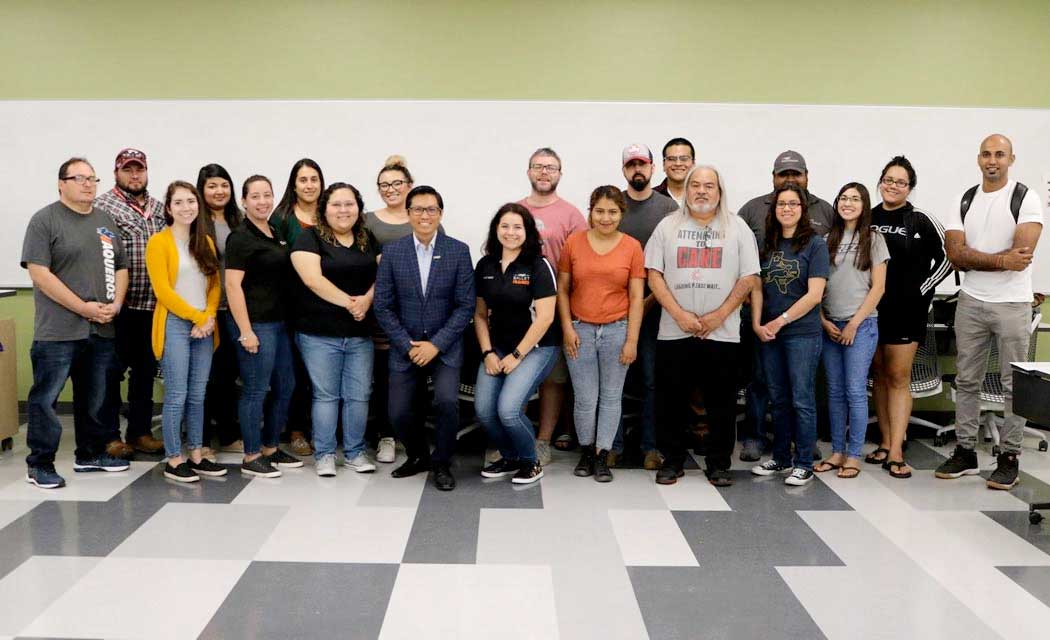
Week 2 (09/03/2019)
Thank you Fire Chief/ Emergency Management Coordinator Antonio Lopez, EMC, LP, the City of Weslaco who delivered a special talk on managing disaster and emergency on September 3, 2019.
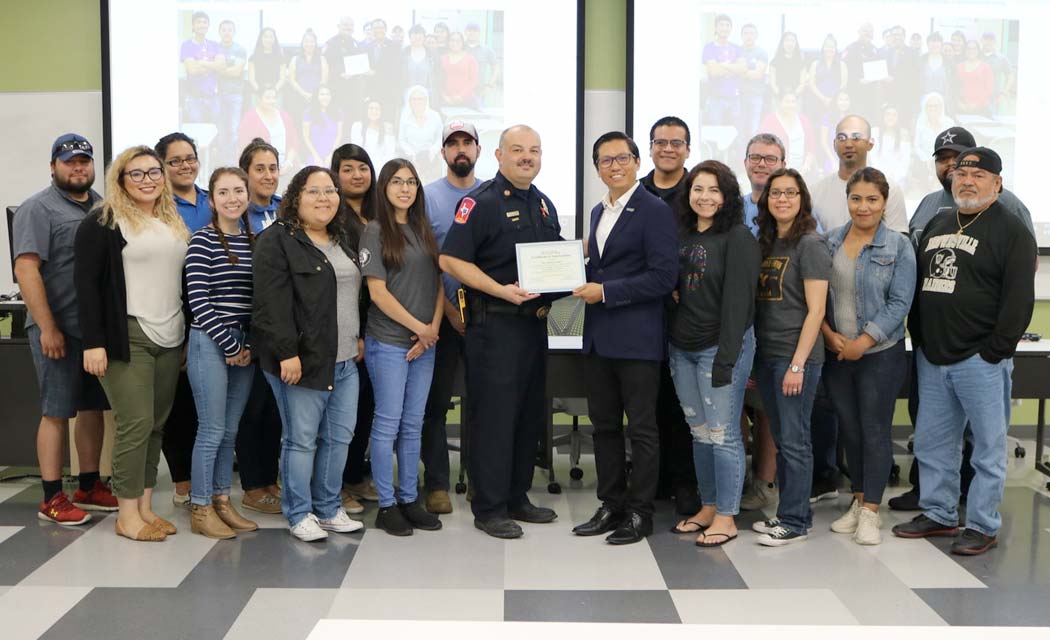
Week 3 (09/10/2019)
Thank you Communications Director/Deputy Emergency Management Coordinator Daniel Ramirez, the City of Pharr for sharing his firsthand experiences in managing disaster and emergency on September 10, 2019.
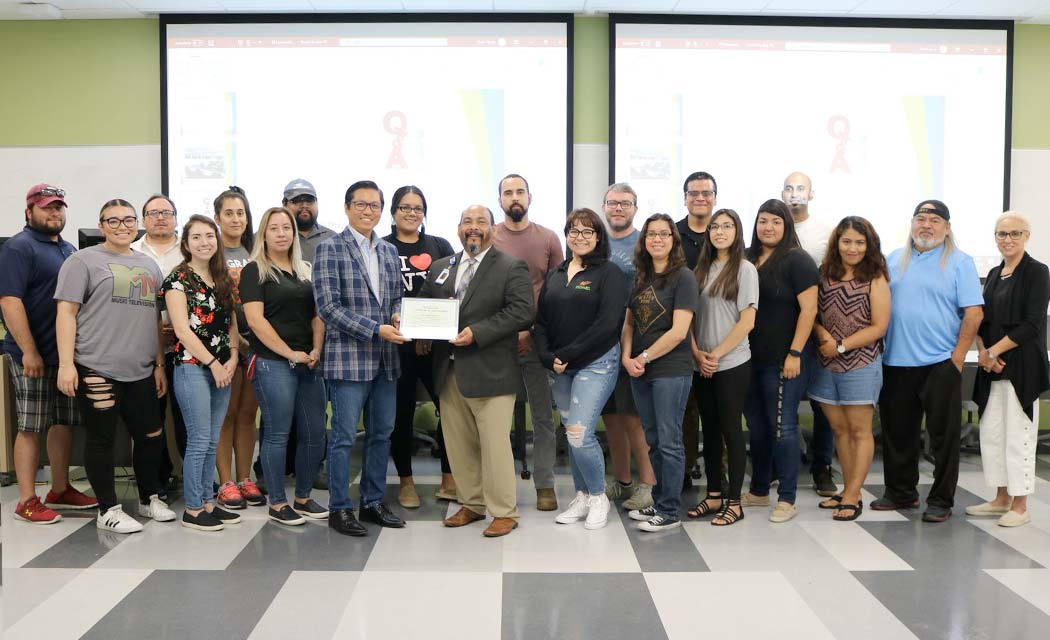
Week 4 (09/16/2019)
This week, our guest speaker postponed to another week due to an emergency situation. In addition to our regular study activities, we carried out one additional activity, which was to brainstorm on an outreach project. In that project, we planned to conduct a performance in group to educate our next generations, middle and high school students on importance of individual disaster preparedness. We could not wait to see.
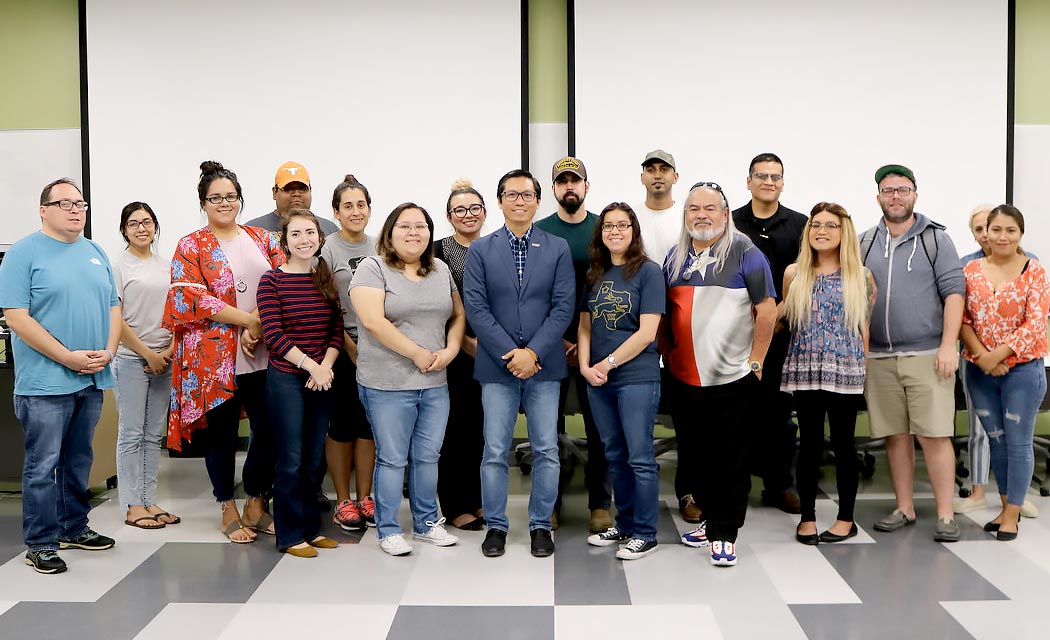
Week 5 (09/24/2019)
Thank you Chief Doug Fowler, Emergency Coordinator, the City of South Padre Island for sharing his experience in preparing and responding to disaster and emergency in San Antonio and South Padre Island today. Chief Fowler offered internship opportunities to our students at his organization.
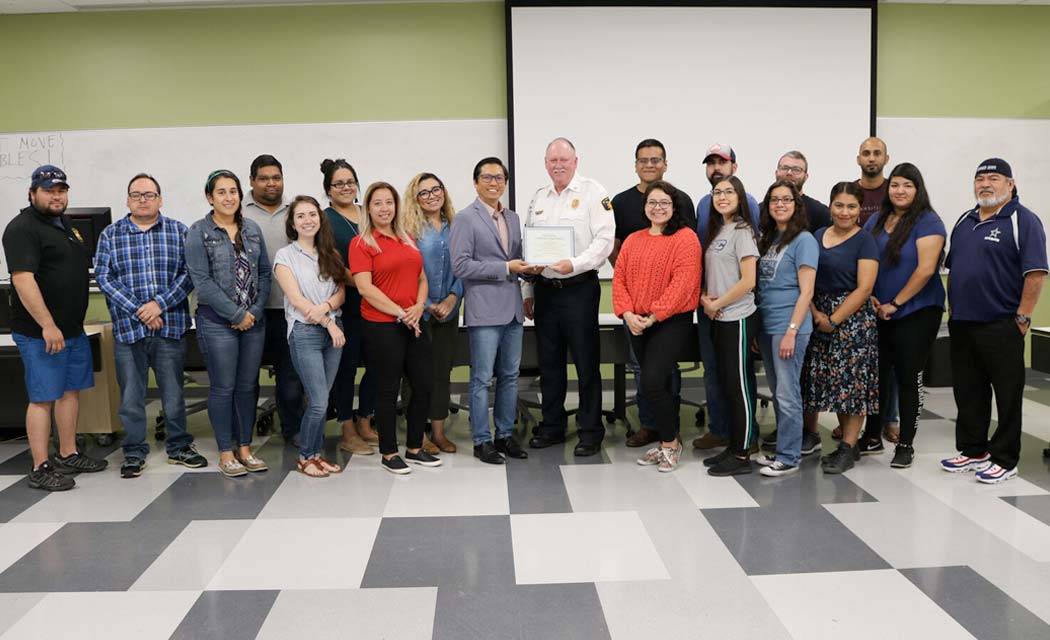
Week 6 (10/01/2019)
Thank you, Assistant Chief Tony Pena, Texas Department of Emergency Management (TEDM), District Coordinator John O'Valle, Region 3 of TEDM, and Ina Chan, Emergency Management Program Specialist, Federal Emergency Management Agency (FEMA) Region 6 for sharing your knowledge and expertise with our students on Oct 1, 2019.
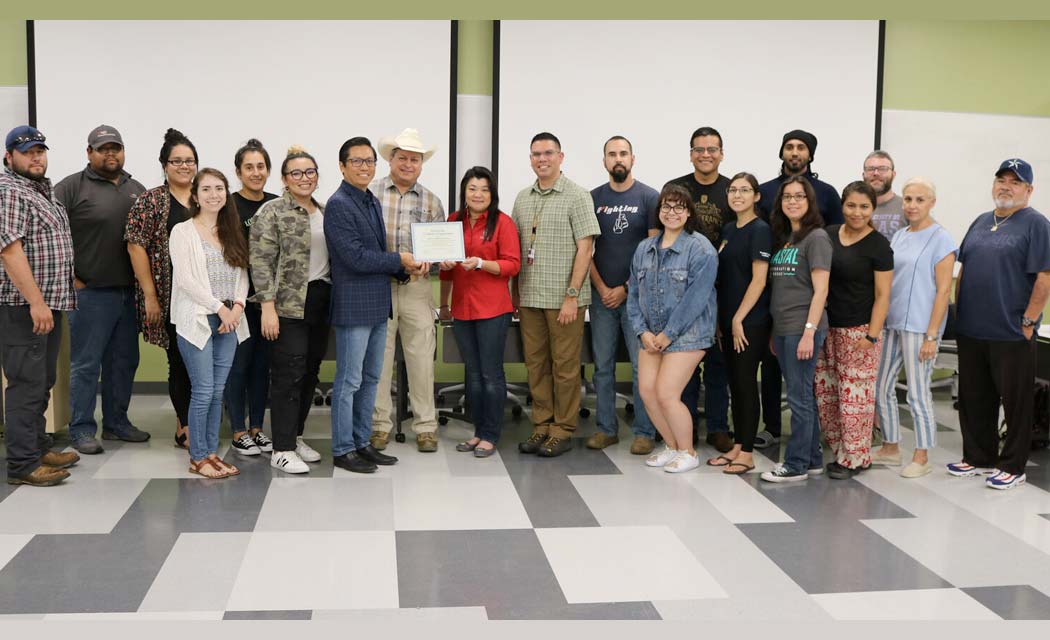
Week 7 (10/08/2019)
Thank you Fire Chief / Emergency Management Coordinator Tommy Ureste, the City of Mercedes who delivered a special lecture in our Disasters and Society class on October 8, 2019. It was great to see an enthusiastic exchange between our guest speaker and my students.
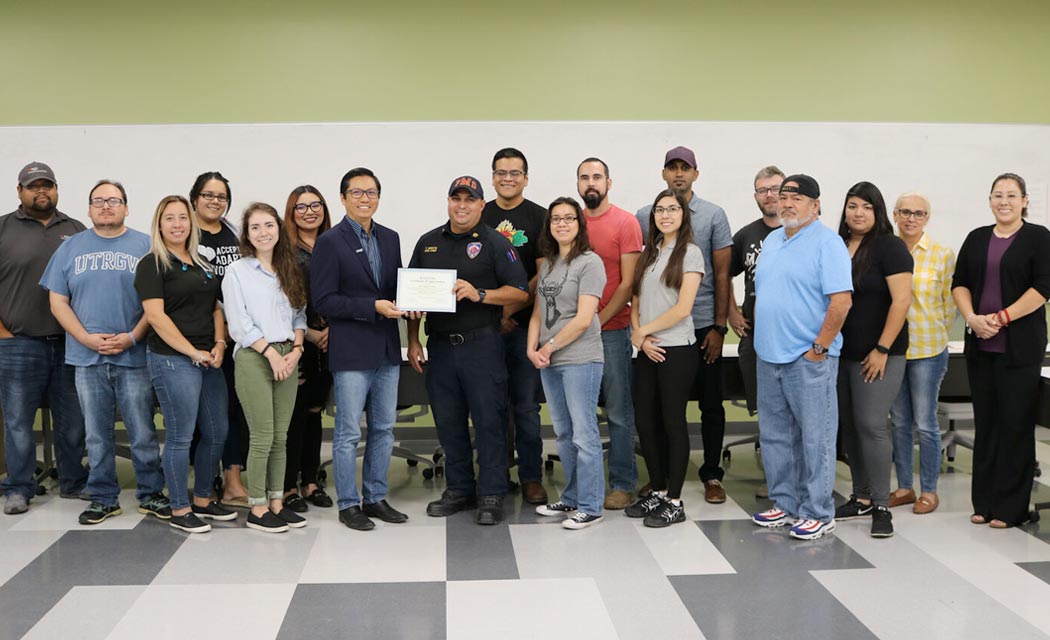
Week 8 (10/15/2019)
Thank you Fire Chief / Emergency Management Coordinator Rogelio Rubio, the City of Harlingen who delivered a special lecture in our Disasters and Society class on October 15, 2019.
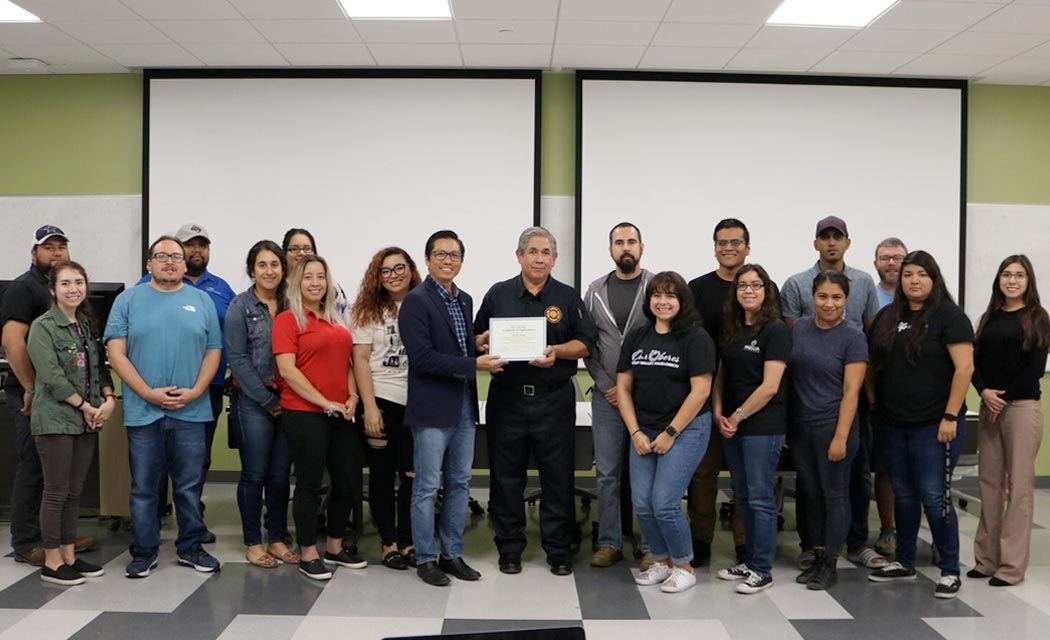
Week 10 (10/29/2019)
Thank you Deputy Fire Chief Ubaldo Perez, the City of Edinburg who delivered a special lecture in our Disasters and Society class on October 29, 2019.
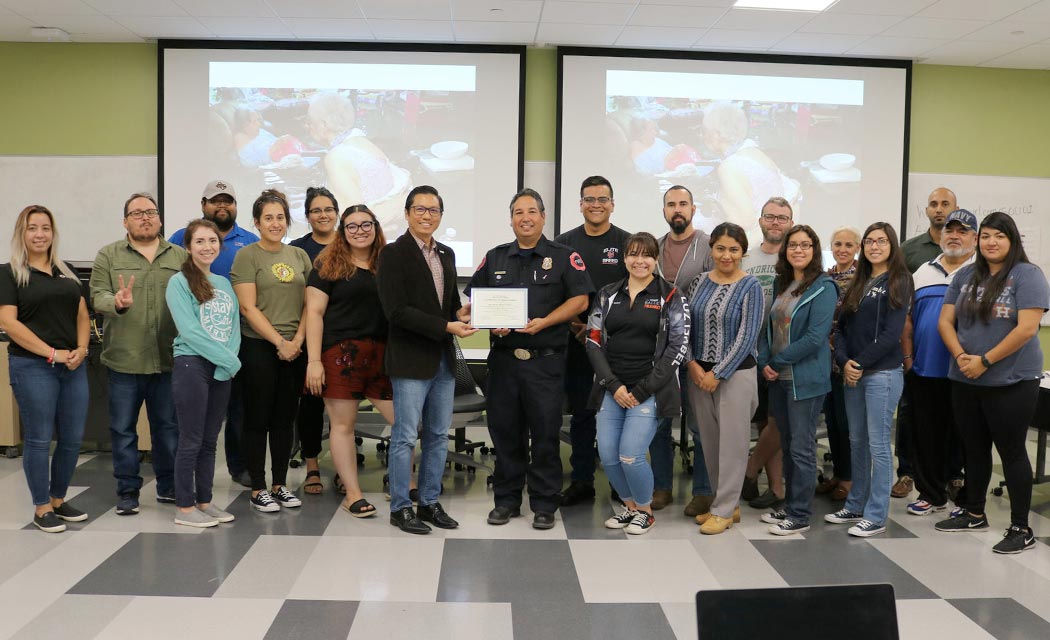
Week 11 (11/05/2019)
Thank you City Manager, and Deputy Emergency Management Coordinator Jeff Johnston, the City of McAllen who delivered a special lecture in our Disasters and Society class on November 5, 2019. Thank you for your service.
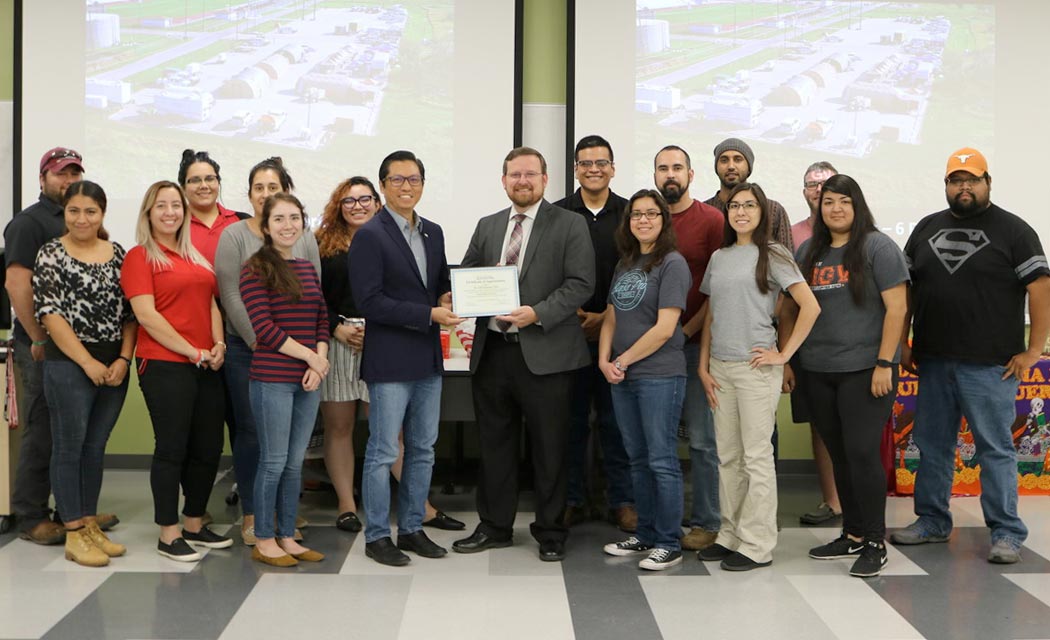
Week 12 (11/12/2019)
Thank you Emergency Management Coordinator Billy Delgado, the City of Corpus Christi who delivered a special lecture in our Disasters and Society class on November 12, 2019.
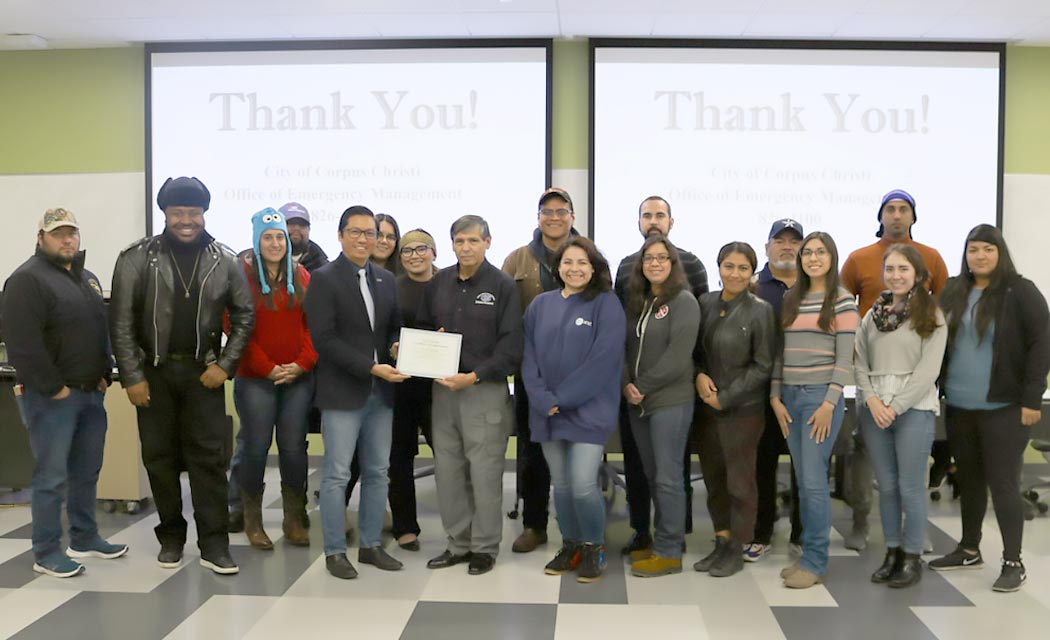
Week 13 (11/19/2019)
Thank you Juanita (Jayni) Saenz, Program Supervisor, Homeland Security & Criminal Justice Programs, Lower Rio Grande Valley Development Council - Public Safety for her insightful presentation.
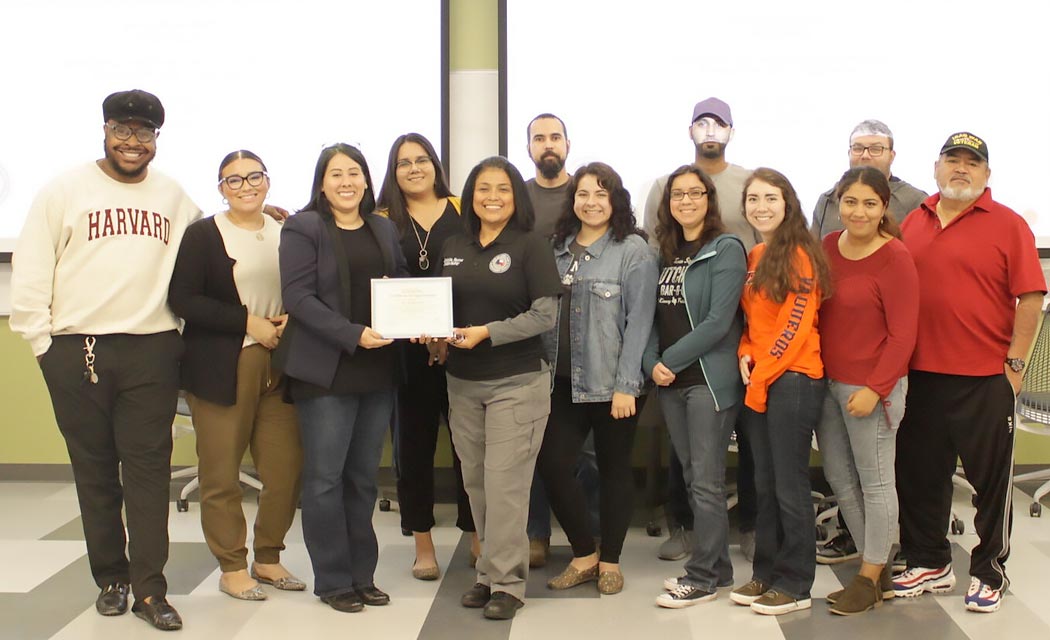
Week 14 (11/26/2019)
Students preformed a service-learning trip to Corpus Christi and Rockport. They visited the Mayo’s Office, the City of Corpus Christi, the Emergency Operation Center (EOC), the City of Corpus Chrisit, and the volunteering coordinator’s office, All hands and Hearts.
Service Learning at the Office of Mayor, the City of Corpus Christi,
November 26, 2019
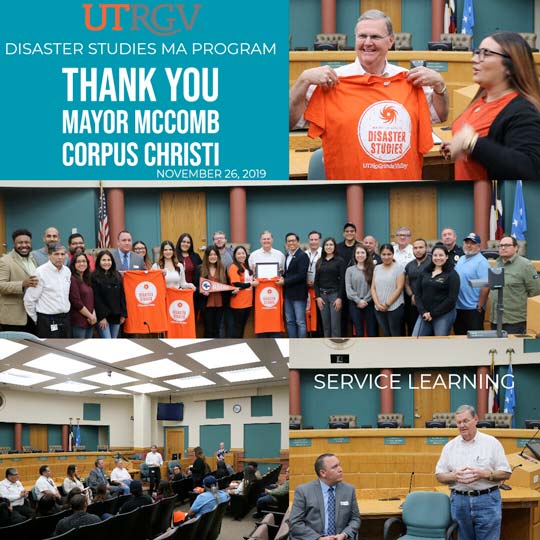
Service Learning at the Emergency Operation Center, the City of Corpus Christi
November 26, 2019
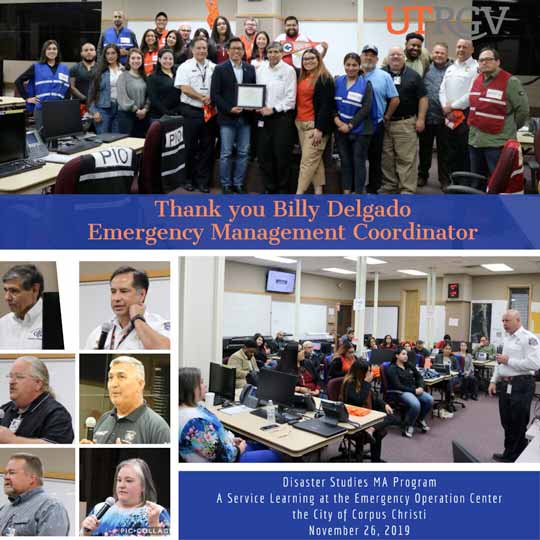
Service Learning at the All Hands and Hearts, Rockport, Texas
November 26, 2019
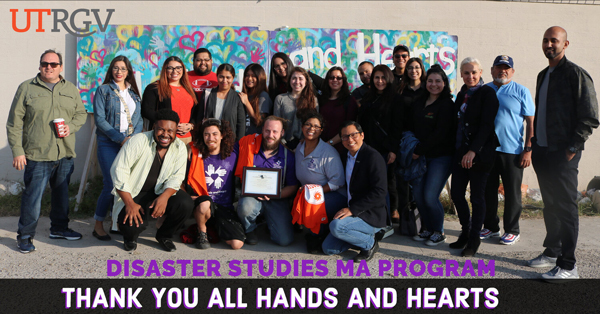
Week 15 (12/03/2019)
Thank you Kevin Hannes, CEM, Federal Coordinating Officer (FCO), Department of Homeland Security (DHS), Federal Emergency Management Agency (FEMA) for sharing your insights on disaster response operations and N-IMAT in my SOCI 6331 Disaster and Society class on December 3, 2019. I particularly liked to hearing about preparedness and your initiatives on N-IMAT are fascinating.
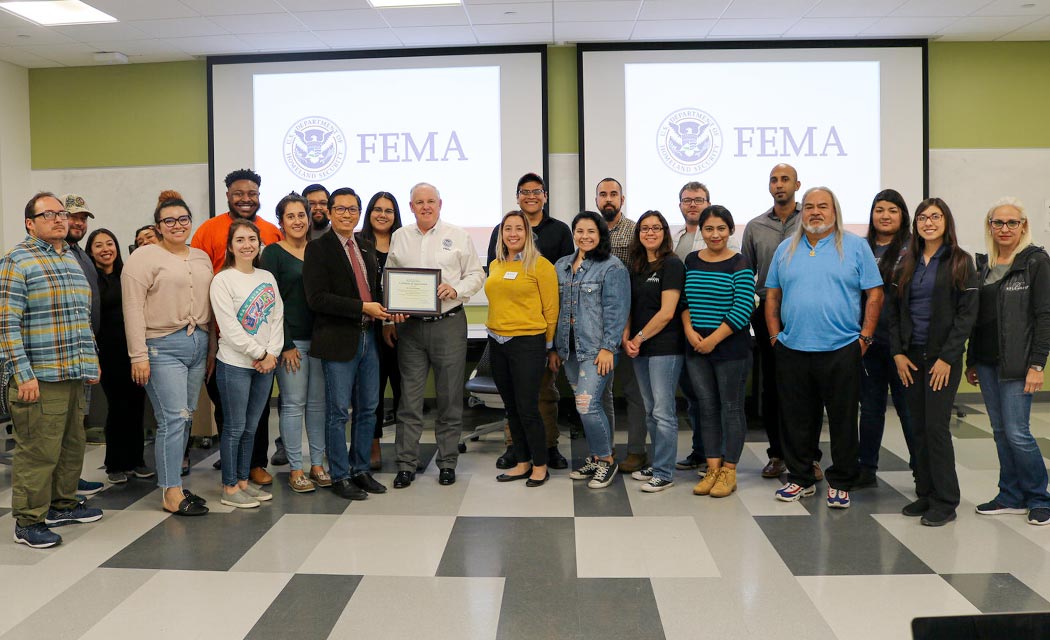
Service Learning at the Emergency Operation Center, the City of Pharr
November 9, 2019
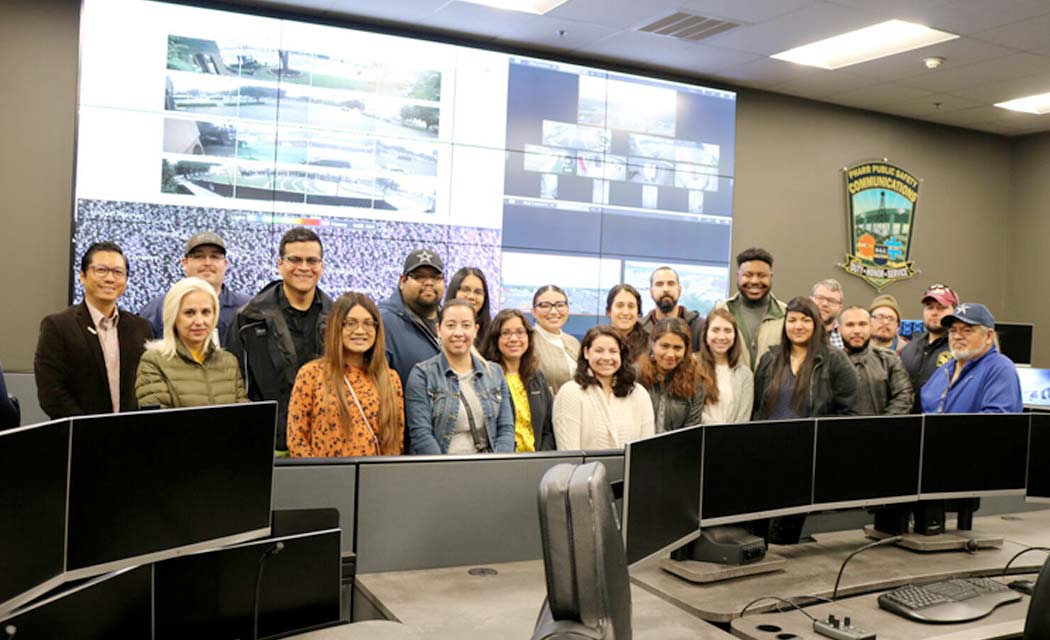
Service Learning Trip to The Regional Center for Public Safety Excellence-South Texas College
November 26, 2019
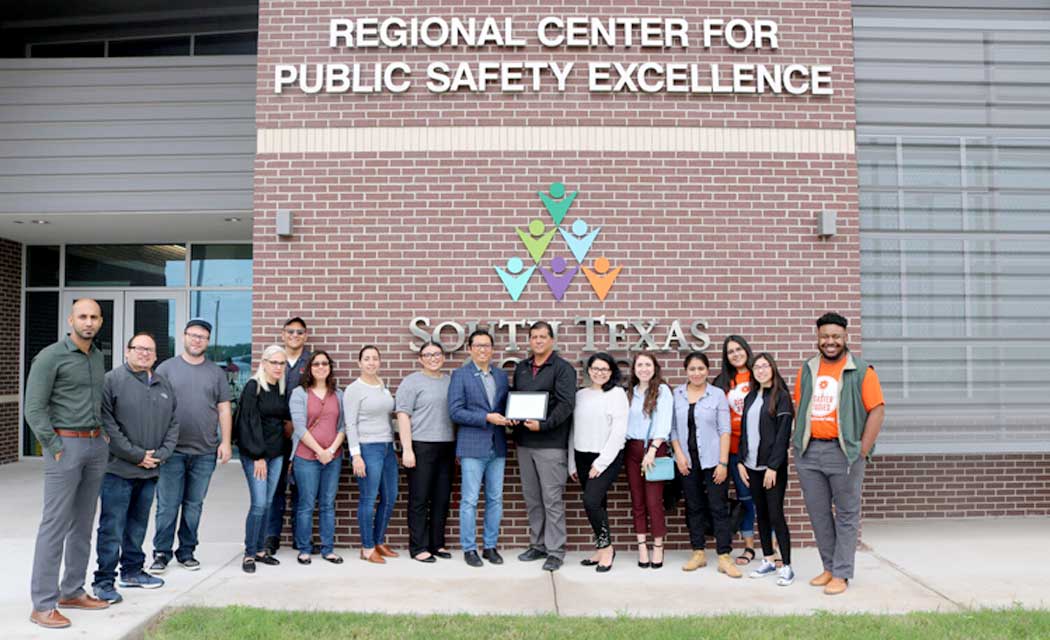
Housekeeping
After you have been officially admitted to the Disaster Studies MA Program, you should follow the following steps.
Step 1: Reach out to the program coordinator to receive a welcome package.
Step 2: Decide your degree plan, thesis or non-thesis.
Step 3: Prepare a degree plan using this degree plan form, and select courses from the course schedule plan. You may also refer to a sample course schedule provided at this page.
Step 4: If you need help with preparing the degree plan, please consult with the program coordinator.
Step 5: When you are only a semester away from completing all the requirements, you should submit a graduation form.
